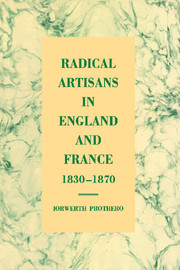Book contents
- Frontmatter
- Contents
- Acknowledgements
- List of abbreviations
- Introduction
- 1 Artisans
- 2 Radicalisms
- 3 Trade unionism
- 4 Work and radicalism
- 5 Socialism
- 6 Co-operation
- 7 Class and radicalism
- 8 Political action and organisation
- 9 Education and civilisation
- 10 Religions and philosophy
- 11 The culture of radical clubs
- Conclusion
- Notes
- Select bibliography
- Index
8 - Political action and organisation
Published online by Cambridge University Press: 24 November 2009
- Frontmatter
- Contents
- Acknowledgements
- List of abbreviations
- Introduction
- 1 Artisans
- 2 Radicalisms
- 3 Trade unionism
- 4 Work and radicalism
- 5 Socialism
- 6 Co-operation
- 7 Class and radicalism
- 8 Political action and organisation
- 9 Education and civilisation
- 10 Religions and philosophy
- 11 The culture of radical clubs
- Conclusion
- Notes
- Select bibliography
- Index
Summary
Political action was not a simple reflection of occupations, communities, or social forces, but created its own identities, procedures, and means and forms of communication. Organisation seems the crucial element in this, and French republicans in the early 1830s saw associations of citizens as the most effective form of opposition to governments. ‘The right of association is a sacred right, it is the sole asylum of the weak.’ After the re-election in 1857 of the republican Hénon to the Legislature, the Procurator-General of Lyons could see only two remedies for such a deplorable situation: one would be to abolish universal suffrage; the other
would consist of carefully removing from these masses all cohesion, all organisation, of stifling into silence the socialist ideas which agitate and influence them. Organisation, be it in the name of philanthropic society, be it attached to a professional journal, be it formed in one shape or another, constitutes the real power of ideas and what are called parties.
As a French radical commented in 1849, England was different from France in its powerfully organised interest groups which acted collectively over issues that affected them and, as permanent checks on government, had made possible a series of liberal gains over the past two centuries. ‘The rulers, in England, have for a long time chosen the slowest and gentlest form of death, and this explains their long life.’ Voluntary associations were central to the development of urban, especially bourgeois, culture, and operated with much greater freedom in Britain, while in France any association needed authorisation. Liberals argued that this led to greater extremism in France.
- Type
- Chapter
- Information
- Radical Artisans in England and France, 1830–1870 , pp. 202 - 229Publisher: Cambridge University PressPrint publication year: 1997

